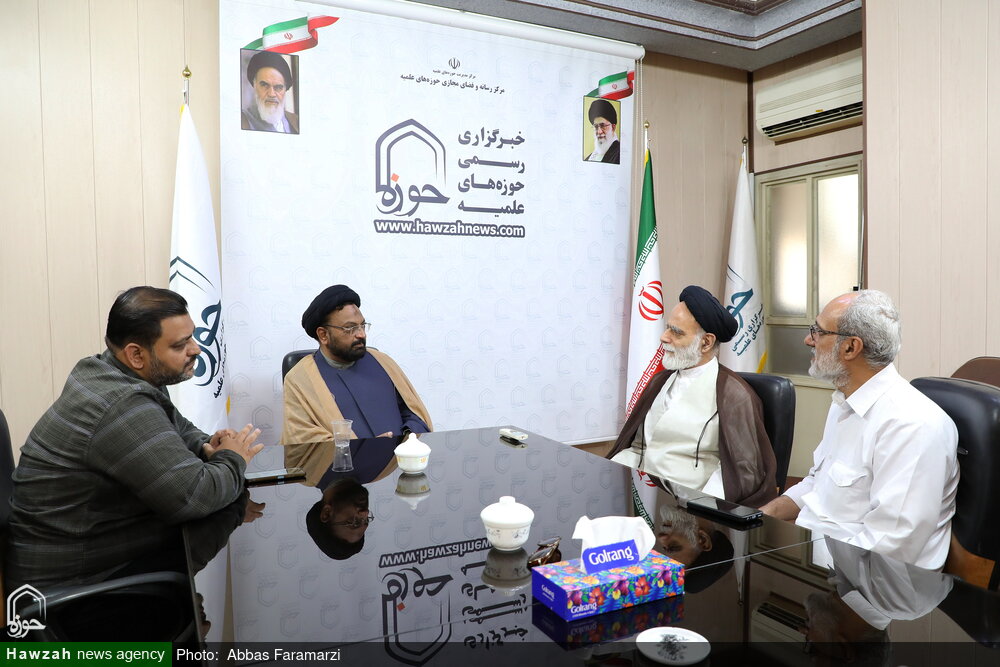Hujjat al-Islam Seyyed Taqi Reza Abedi, Chairman of the Southern Indian Ulema Council, expressed his views on the propagation of religion, the impact of the Islamic Revolution, the upbringing of the young generation and Islamic unity in an exclusive interview.
Below is the text of this interview:
As the Chairman of the Southern Indian Ulema Council, what have been the most important goals and focuses of your religious and social activities so far?
Hujjat al-Islam Seyyed Taqi Reza Abedi: Our activities are based on a sense of religious responsibility and individual effort. In this regard, we have paid special attention to the revival of authentic religious traditions such as I’tikaf, holding prayer meetings, and the intellectual and faith education of the younger generation.
Given your deep knowledge of the Hyderabad Deccan region, how do you assess the current situation of the Shia community in this region?
Hujjat al-Islam Seyyed Taqi Reza Abedi: Hyderabad Deccan, India is a sensitive region with high potential. Although Shias are in the minority, they have an effective presence in the scientific, social, and even governmental structures. However, unfortunately, the authentic teachings of Shiism and the spiritual influences of the Islamic Revolution have not been given the attention they should have in this region.
In your opinion, why did the Hyderabad Shia community fail to benefit sufficiently from the teachings of the Islamic Revolution?
Syed Taqi Reza Abedi: The people were prepared, but some scholars and religious figures failed to fulfill their mission. This void caused superficial and sometimes perverted thoughts to replace the pure monotheistic and guardianship thought. But I believe that if scholars take on the initiative today with insight and planning, this trend can be corrected.
In your remarks, you mentioned the revival of the tradition of prayer and I’tikaf. What steps have you taken in this regard?
Syed Taqi Reza Abedi: With divine success, in the past years we were able to revive the blessed tradition of I’tikaf in Hyderabad. Also, important supplications such as Dua al-Kumayl, Dua al-Tawasul and other supplications of Ahl al-Bayt (PBUT) that were less paid attention to have been revived among the people. Our goal is to distance people from imaginary and useless stories and connect them to the authentic teachings of Ahl al-Bayt (PBUT).
Given today’s cultural and social conditions, what is your solution for the religious education of the young generation?
Hujjat al-Islam Seyyed Taqi Reza Abedi: The most important way is to present a genuine and pure religion; a religion that is based on monotheism, imamate, ethics, and rulings. When faith is strengthened in the hearts of young people, ethical and practical issues will also be effective. Creating a study environment, holding religious workshops, and discussion sessions for young people are among the necessary solutions.
In a society like India, which has great religious diversity, how can Islamic unity be realized?
Seyyed Taqi Reza Abedi: Islamic unity is a vital necessity in such societies. Instead of focusing on differences, we should emphasize commonalities. Unity will be sustainable when the principles of religion and ethical values are the center of social communication.
In your opinion, what are the most important characteristics and responsibilities of a religious scholar?
Seyyed Taqi Reza Abedi: A religious scholar should familiarize people with the pure religion of Islam; that is, monotheism, guardianship of the Ahl al-Bayt (PBUT), and the divine lifestyle. But this work will be effective only when the scholar himself is outstanding in knowledge, action, and sincerity and can gain the trust of the people.
How do you assess the role and significance of seminaries for Indian students?
Hujjat al-Islam Seyyed Taqi Reza Abedi: Nowadays, when the world is facing cultural and intellectual attacks, seminaries are like a strong fortress. Indian students should be educated in such a way that they specialize not only in jurisprudence and principles, but also in beliefs, theology, interpretation, ethics, history, and current issues. The seminary is not only a center of learning, but also a place to train intellectual, spiritual, and revolutionary leaders.














